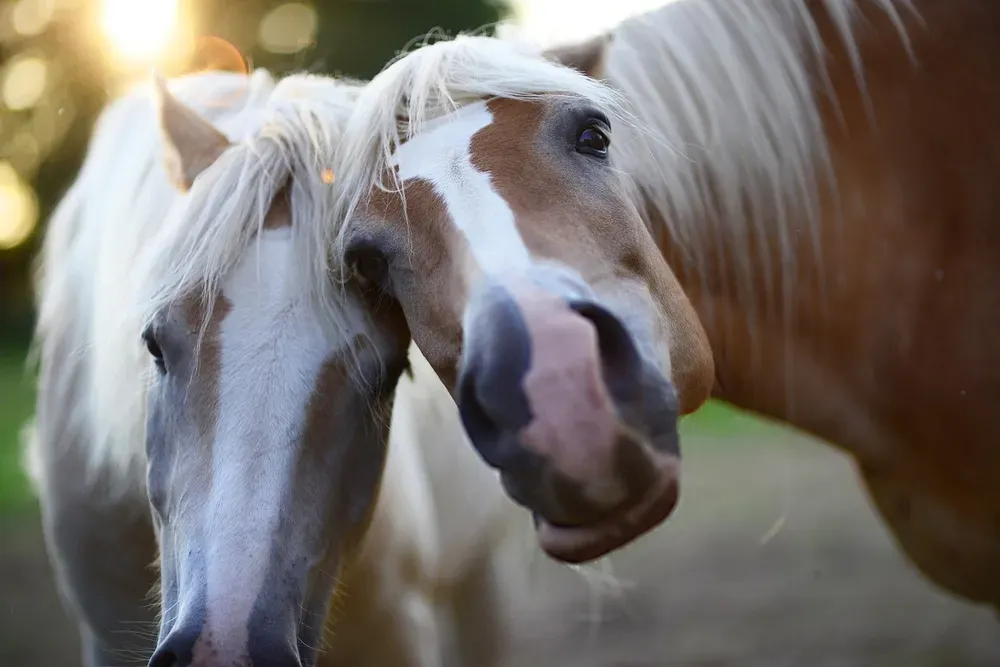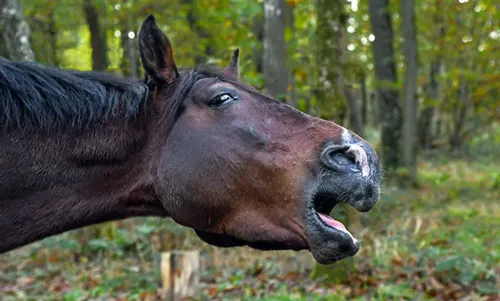
Table of Contents
Introduction
When your horse develops a cough, the cause can range from a life-threatening problem to a mild condition of no concern. As horse owners, we must understand the different causes and know when medical assistance is required. Some coughs are caused by a pathology that only responds to medical intervention; others may need changes in the horse's environment.
Is My Horse's Cough a Problem?
Some horses give a few coughs at the start of more vigorous exercise (trotting or cantering). These horses are clearing their airways, and some will do the same when they leave the stable and breathe cold air. However, coughing while exercising is otherwise a health issue that must be investigated, as persistent coughing during exercise is caused by an infection, allergy or physical problem. Horses that cough when exercised must not be ridden until the problem is sorted and the animal is healthy.
What Type of Cough Does My Horse Have?
Your horse could have a chronic or an acute cough that is either dry or moist. First of all, identify the type of cough. An acute cough only lasts up to three weeks and is frequently the result of an infection, while a chronic cough persists with potential long-term health problems. A dry cough does not produce mucus while a moist cough produces mucus. The type of cough is the first indication of what is causing the problem. Chronic dry or moist coughing is generally associated with a physical problem or an allergy. On the other hand, an infection causes a moist acute cough.
What Physical Problems Cause My Horse to Cough?
If an infection or allergy does not cause your horse's cough the problem is probably physical. Here are the main physical problems that will cause equine coughing.
- Choking when eating can cause a coughing fit, but this generally resolves unless food has been inhaled into the lungs. A choking horse with a food blockage in its oesophagus will have a considerable discharge from both nostrils and will make attempts to swallow. The horse's neck is frequently stretched and lowered. The horse might be coughing to clear any mucus discharge.
How do I treat a Choking Horse?
Although choking generally resolves spontaneously it takes time and is very distressing for the horse owner. A vet will use drugs to relax the oesophagus and use sedatives to encourage the horse to lower its head. This will help prevent food from entering the windpipe. Antibiotics can be administered to stop lung infections. Sometimes a vet will wash out the blockage with a stomach tube. In rare cases, pneumonia results from food entering the lungs.
- Dental problems that prevent a horse from chewing can cause coughing.
Detecting Dental Problems!
The horse can present with dental problems needing a tooth extraction. However, in many cases the teeth are sharp and this makes it hard for the animal to chew. These horses will need their teeth filed to remove the sharp edges. A horse that is in pain from sharp edges to its teeth generally spits out partially chewed food and this is called quidding.
- Epiglottic Entrapment that generally needs surgical intervention. Although whistling or roaring noises when engaged in vigorous exercise are the most common signs, coughing and nasal discharge, with head shaking are also clinical signs of epiglottic entrapment, particularly with older horses.
What are the procedures for Epiglottic Entrapment?
In mild cases, exercise restriction and anti-inflammatory drugs will manage the problem. In other cases, surgical procedures are used with generally good results.
- Congestive Heart Failure causes fluid in the lungs and poor performance. This will need veterinary intervention and the horse's retirement.
My Horse Has a Dry and Hacking Horse Cough!
Dry, hacking coughs often hint at long-term underlying respiratory irritations from environmental factors to allergies. Understanding the nature of these coughs is crucial for effective intervention and to prevent the horse from developing Heaves. Your horse may have Inflammatory Airway Disease.
Does My Horse Have Inflammatory Airway Disease?
This generally affects performance horses and racehorses causing periods of poor performance. Lung stress, dust inhalation and viral respiratory infections are frequent triggers for the development of Inflammatory Airway Disease. This condition causes chronic coughing and nasal discharge with exercise intolerance. However, fever and unusual lung sounds are not normally present. A horse with this condition will need veterinary interventions. and frequently need environmental changes to reduce dust inhalation. The horse will be susceptible to developing Heaves.
Read this Article Suggestion for more on Equine Heaves.

Article Suggestion
Understanding Heaves in Horses: Causes, Treatment, and PrognosisMy Horse Has a Moist and Productive Cough!
Moist coughs, generally signify the presence of respiratory infections or allergies and the horse is coughing to expel mucus from its airways. The nature of this mucus indicates the underlying problem. A bacterial infection causes thicker mucus that is coloured white or yellow. Viral infections produce mucus that is either clear or has a colour.
What Viral Infections Will Make My Horse Cough?
Viral infections in horses can manifest as coughs, disrupting the natural harmony of their respiratory system. Equine influenza and herpesvirus are among the common viral culprits.
- Influenza affects the horse's respiratory tract and is spread through coughing. The horse usually has a nasal discharge with a fever and reduced appetite. Airways will be inflamed, and secondary bacterial infections will sometimes occur.
How do I treat a horse with Influenza?
For most horses supportive and nursing care is required and a significant period of convalescence. NSAIDs are used to reduce fever and to prevent complications.
- Equine Herpesvirus EHV-1 is a very contagious respiratory disease causing fever, coughing and nasal discharge. Mares with this condition frequently abort their foals and young foals can die from the infection. EHV-4 also causes respiratory problems, and sometimes pregnant mares will abort. It is not common, but both EHV-1 and EHV-4 have a rare neurological form that is frequently fatal,
Are Vaccines for EHV-1 and 4 Effective?
Vaccinating makes the clinical signs of the respiratory condition milder and helps to prevent the virus from spreading but it is ineffective in preventing the rare neurological form of EHV. As with equine influenza nursing care and convalescence will be required with NSAIDs to reduce complications and reduce fevers.
Why Does My Young Horse Have a Cough?
Young horses are prone to coughing caused by viral infections mentioned above. However, they are also particularly susceptible to certain bacterial and parasitic infections. Two infections that will cause foals and yearlings to cough are:
- Ascarid Infections
Coughing in foals and yearlings is often associated with an Ascarid parasitic infection. Ascarid infections can cause coughing in foals although adult horses are generally immune to the effect of Ascarids. It is very important to adhere to a strict worming programme to prevent this type of parasitic infection.
- Rhodococcus Equi Bacterial Infections
Foals and occasionally older horses can develop a type of pneumonia picked up through bacteria living in the soil. and inhaled into the lungs. This causes coughing, laboured breathing, fever, and depression. Sometimes lung abscesses and joint infections develop and severely affected foals can die.
How will my Vet treat Rhodococcus Equi?
The antibiotics used to treat this condition (erythromycin, clarithromycin, and azithromycin) can have side effects of diarrhoea and overheating.
What Bacterial Horse Infections Will Cause My Horse to Cough?
Bacterial infections pose a unique challenge to equine respiratory health. Strangles, pneumonia, and other bacterial invasions can trigger coughs with distinctive characteristics. Unmasking the culprit is key to sorting the problem as some bacterial infections are more dangerous than a common cold or cough. Three infections to be aware of are:
- Shipping Fever and this is severe aspiration pneumonia. If your horse starts to cough after being transported you must consider shipping fever which can be life-threatening and always needs prompt veterinary support. The symptoms are depression, coughing, nasal discharge and fever.
- Strangles is a very contagious bacterial infection of the upper respiratory tract that results in enlarged lymph glands that obstruct breathing and the presence of nasty abscesses with a thick yellow nasal discharge and coughing. Antibiotics and nursing care will effect a cure and the horse will not develop the condition again.
Some horses that have recovered from the strangles bacteria remain contagious!
About 10% of horses appear to have recovered from Strangles but are still infected and can pass on the bacteria to other horses. These horses need guttural pouch examination and the removal of balls of puss followed by antibiotics to kill the remaining bacteria. They will be re-examined after two weeks to make sure they are infection-free.
- Bacterial Pneumonia causes depression, coughing, nasal discharge and fever; this can be a secondary infection in adult horses. Mild cases are easily treated with nursing and using antibiotics and anti-inflammatory drugs. In bad cases, the lungs can be permanently damaged.
The take-home Message
As horse stewards, we must identify the cause of an equine cough so that appropriate support is given. Equine respiratory health is a delicate tapestry woven with various threads of cough types. Some coughs are easily dealt with while at the other extreme, some are life-threatening. Many coughs are very contagious and affected horses must be isolated to keep other horses as safe as possible.
FAQs
Can a persistent cough permanently affect my horses lungs?
Can I ride my horse if he has a mild cough?
Can I tell if my horse is a carrier of Strangles?
Is it a problem If my horse coughs a few times when being ridden?
Can I still ride my horse if he has Heaves?

Article Suggestion
Kissing Spine in Horses: Causes, Symptoms, and Treatment Options
